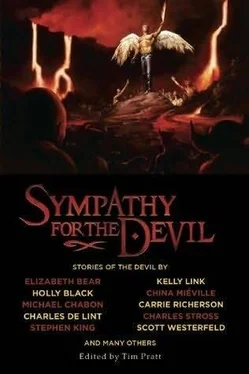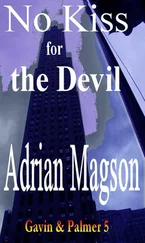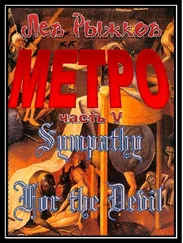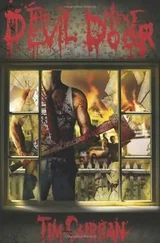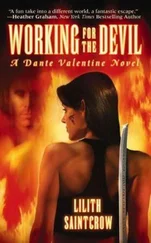“You can talk, then!” observed the old woman.
“I can,” said Walpurgis. “And I want this bell off. Now. And be quick about it.”
The old woman stared at the goat and then she folded her arms. “I had no idea you’d be this kind of goat,” she said.
“To the Devil with that,” said Walpurgis carelessly. “What’s the difference? It’s this bell I’m talking about. Come over here and take it off.”
“I can’t,” said the old woman. “If I do, the Devil will steal you away for sure.”
“If you don’t,” said the goat, “I’ll yell and raise a ruckus.”
“Yell away,” said the old woman. “I’ve got no choice in the matter that I can see.” And she went back inside the cottage and shut the door.
So Walpurgis began to yell. He yelled all the bad words he knew and he yelled them loud and clear, and he yelled them over and over till the countryside rang with them, and before long the old woman came out of her cottage with her fingers in her ears. “Stop that!” she shouted at the goat.
Walpurgis stopped yelling. “Do something, then,” he said.
“All right, I will!” said the old woman. “And serve you both right. If I’d known what kind of a goat you were, I’d have done it in the first place. The Devil deserves a goat like you.” She took away the bell and set Walpurgis free and right away the Devil leaped up from the grass and took the goat straight back to Hell.
Now the funny thing about the power of speech is that the Devil could give it away but he couldn’t take it back. For a while it was amusing to have a talking goat in Hell, but not for very long, because Walpurgis complained a lot. He’d always been dissatisfied but being able to say so made all the difference. The air was too hot, he said, or the food was too dry, or there was just plain nothing to do but stand around. “I might as well be wearing a bell again, for all the moving about I do in this place,” said Walpurgis.
“Don’t mention bells!” said the Devil.
This gave Walpurgis the very idea he was looking for. He began to yell all the bell-ringing words he knew. He yelled them loud and clear-clang, ding, jingle, bong-and he yelled them over and over till Hell rang with them.
At last the Devil rose up with his fingers in his ears. “Stop that!” he shouted at the goat.
Walpurgis stopped yelling. “Do something, then,” he said.
“All right, I will!” said the Devil. And with that he changed Walpurgis into a stuffed goat and took him back up to the old woman’s cottage and left him there in the yard, tied up to the tree.
When the old woman saw that the goat was back, she hurried out to see how he was. And when she saw how he was, she said to herself, “Well, that’s what comes of talking too much.” But she put the bell around his neck and kept him standing there anyway, and since the sign was still there too, and still said THIS IS A REAL GOAT, nobody ever knew the difference. And everyone, except Walpurgis, was satisfied.
The Redemption of Silky Bill by Sarah Zettel
“He’ll eat the Cheyenne too, you know,” said the coyote.
Standing-in-the-West picked up another log and rested it on the chopping stump. A fresh wind blew off the prairie, ruffling his newly-cut hair and the cloth of his cotton shirt. “Go away, Wihio.”
The coyote looked towards the canvas enclosure that served Fort Summner as a church and then back to the Cheyenne brave wielding the steel axe as if it weighed no more than a feather. “You’ve forgotten who you are,” said Wihio.
“No.” Standing-in-the-West brought the axe down onto the wood. Thwak! “Peter Standing-in-the-West.” Thwak! “He is good Christian.” Thwak! “He helps Reverend.” Thwak! “He preaches Bible book to Red Man. ” The log splintered in two. “And he has found a way to get rid of the White Man using the White Man’s own medicine.” He hefted the axe in both hands. “When you would not even deign to help him. Go away, Wihio.”
Wihio shrugged, and went.
“Silky” Bill McGregor picked up the chunk of rock, keeping one eye on the Cheyenne that pitched it down. The withered old man didn’t look like he could squash a bug, but the buck at his side, all done up in red paint and feathers, was another story. McGregor couldn’t figure out why no one was making a ruckus about the pair of them standing bold-as-you-please in the middle of Fort Summner ’s only street with spears in their hands and bows on their backs. But nobody did. The morning traffic on foot, and on horse and wagon, just clumped and rattled around them. Folks sneered or they whispered, but nobody asked nobody’s business. Nobody ran for the soldiers or the sheriff. Which didn’t make sense.
McGregor turned the rock over in his long fingers. The hazy summer sun picked out the glittering flecks of silver embedded in its brownish surface. Although McGregor made his living at cards, he had some experience with raw ore. To his eye, this rock had come from what could be a valuable hunk of ground.
“Where’d you say you found this?” He cocked his eyebrows.
“We will show you the place.” The old man has a voice as dry as dust. “Fallen Star,” he tapped his own chest. “He will guide you, but first you must help the People. One of our braves has summoned your Devil. We want you to send it away.”
McGregor’s first impulse was to bust out laughing, but being stared at by the old Red was like being stared at by the mountains, and the mountains thought this was too big to be laughed at.
“Tall order.” McGregor tugged at the brim of his hat. “You’d be better off seeing the preacher for something like that.” He jerked his chin towards the tent church.
The old man shook his head. “The preacher will not listen to us. The soldiers will not listen to us. Your Devil is a dark and bloody mystery, White Man. I do not understand him. We need a white man to send him away. We do not have a holy man, we do not have a brave. We must get a trickster.”
“Well, now.” McGregor tucked the rock into his jacket pocket. “I’ll have to think about it.”
Fallen Star nodded. “When you have made up your mind, meet us on the northern edge of your town. Long Nose, come.” The brave and the old man turned and walked slowly down the street. The folks passing by steered wide of them, but still, nobody said nothing.
“Never thought I’d see Silky Bill McGregor stoop to talk to a couple of whiskey-soaked reds.” Ned Carter laughed at him from the door of the Royale saloon until his belly shook. Ned and Bill had been partnering around together for years, flush and broke, and Bill’d never figured out how he managed to stay so fat.
“Whisky-soaked ain’t what I’d call ’em.” McGregor remembered the old man’s eyes. Crazy as a possum at noon, maybe, but he was stone-cold sober.
Ned was staring at him now. “What’re you talking about? Neither of ’em could stand up straight. What were they after?”
“I don’t know.” Bill said absently. His head was still working on how he and Ned, and apparently the rest of the town could have seen such a different set of reds. His throat started itching and he realized he wanted a drink.
Ned ambled over and slapped him on the shoulder. “Well I do know. They was after money, or whiskey. And I know something else. Jamie Raeburn’s gettin’ up a game tonight and if we’re real polite, you and me might finagle ourselves a couple of seats.” He winked.
“You go on, Ned. I got some thinking to do.”
Ned shrugged and took himself back indoors. McGregor strolled away down the hard-packed dirt street, dodging a couple of drovers on horses and side-stepping a load of workmen with tool bags. The town outside Fort Summner was just a touch over three years old and its canvas shanties were just beginning to be replaced by board and shingle buildings that looked like they might actually last awhile. People were filling the place up, coming in and out of the store and the stable almost as much as they were coming in and out of the three saloons.
Читать дальше
